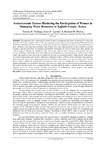Socioeconomic Factors Hindering the Participation of Women in Managing Water Resources in Kajiado County, Kenya

View/
Date
2014Author
Gathagu, Teresia W.
Agwata, Jones F.
Mulwa, Richard M.
Metadata
Show full item recordAbstract
The important role women play in water resources management has been recognized for a long time
globally and in most societies, they are the ones primarily responsible for the management of household water
supply and sanitation. In these societies, women also play the role of family care givers in terms of provision of
food, nutrition, clean water and sanitation. Due to these roles, they depend directly on the availability of water
resources and have therefore accumulated considerable knowledge on water in terms of location, quality and
storage methods. Despite the significant roles that women play in water resources management, they face
various challenges that hinder them from effectively participating in its management in various parts of the
world. The purpose of this study was to examine the various socioeconomic factors inhibiting the participation
of women in managing water in three Divisions of Kajiado County in Kenya. Semi structured questionnaires,
focus group discussions, key informant interviews and direct observations were used to collect data. The key
factors found to affect the participation of women in water resources management were cultural practices,
gender inequalities, lack of formal education, poor access to water sources and lack of decision making power
and land ownership rights. It is recommended that concerted efforts be made to educate the local community,
improve access to water sources through construction of multipurpose water projects and gender
mainstreaming in water resources management in the County
